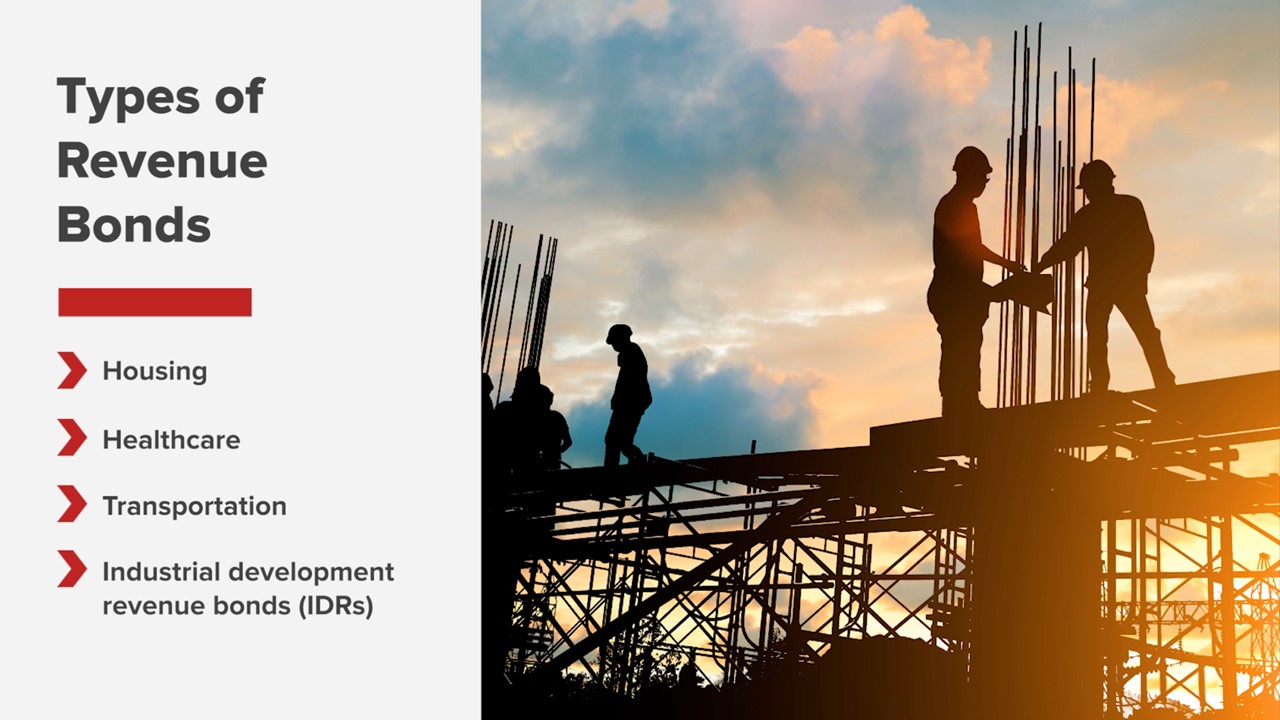Study Notes:
Revenue bonds are generally debt instruments used to finance certain revenue-generating projects that reside within a state, local government, or other municipal authority. These may be used to help fund construction or improvements at:
- Airports,
- Water and sewer systems,
- Hospitals,
- Bridges, and
- A host of other types of facilities
Unlike GOs, payments to holders of revenue bonds are not sourced from taxes but from the cash flows generated by these projects. That makes revenue bonds typically riskier than GOs should these revenues fall short of the requisite debt service funding.

To make principal and interest payments to bond holders, an issuer that sells a revenue bond to build a turnpike, for example, would likely use toll payments or user fees as its source of funding. If those revenues are not enough to fund the debt service, the issuer may face default on payment to its bond holders.
Alternatives to GOs
Revenue bonds may also be offered as alternatives to GOs.
This can occur in situations, for example, when an issuer fails to acquire voter approval for a GO, or when the municipality’s debt ceiling has been reached and GO issuance has been restricted.
Types of Revenue Bonds
When you consider all the various needs of a municipality that have the potential for generating revenue – you would find there are several different types of revenue bonds underpinning their financing.

Some of the more typical types of revenue bonds include:
- Housing bonds
- usually sold to help fund housing for lower income households
- Healthcare bonds
- typically used to help finance the construction of non-profit hospitals and health care facilities
- Transportation bonds
- issued to fund projects such as:
- bridges,
- tunnels,
- toll roads,
- airports, and
- transit systems; and
- Industrial development revenue (IDR) bonds
- sold by a municipality to build facilities for private companies
- issued to fund projects such as:
Other types of revenue bonds include:
- Education bonds,
- Moral obligation bonds,
- Utility bonds, and
- Special tax bonds
Before investing in a revenue bond, a bond investor may want to analyze several factors about the issuer.
Remember, for revenue bonds, investors are repaid from the cash flows generated by the constructed project – not by tax receipts.
Potential buyers of revenue bonds would therefore want to:
- Compare the project’s revenue streams to the amount of debt service required to pay the bond holders,
- Determine whether items such as operating and maintenance expenses need to be deducted from the revenue calculation,
- Determine whether the project’s feasibility study lists any impediments to the project’s cash flow, and
- Determine whether the debt service coverage ratio – the amount of available revenue versus the required debt service amount – is sufficient.
For example:
A Revenue Bond Issued for the Construction of a Turnpike
For a revenue bond that’s intended to fund the construction of a turnpike, recall that the source of the project’s cash flow will likely come from toll payments or user fees.
Let’s say the turnpike generates annual gross revenues of US$6 million and requires US$1 million of annual operating and maintenance costs. This brings the annual net revenue to US$5 million.
Meanwhile, the issuer is obligated to pay US$2.5 million in debt service to its bond holders.
To determine the debt service coverage ratio, divide the net revenue (US$5 million) by the debt service requirement (US$2.5 million), which in this case results in a ratio of 2 to 1, which is sufficient.
Debt Service Coverage Ratio (DSCR) = (Annual Net Revenue / Debt Service Requirement)
Contractual Obligations
Muni bond investors will also likely look very closely at the revenue bond’s indenture, also known as the bond resolution or trust agreement, for those provisions that detail the issuer’s responsibilities in the transaction, as well as the rights of the bond holder. In short, these provisions comprise the contractual obligations, or covenants, set forth for both buyer and issuer.

Flow of Funds
The indenture should also spell out how the revenues from the project will be disbursed, which is commonly known as the bond’s flow of funds.
The bond resolution will include these funds, which are established as repositories for specific costs, such as for debt service, operation and maintenance, renewals and replacements, construction, as well as a sinking fund.















Join The Conversation
If you have a general question, it may already be covered in our FAQs. If you have an account-specific question or concern, please reach out to Client Services.